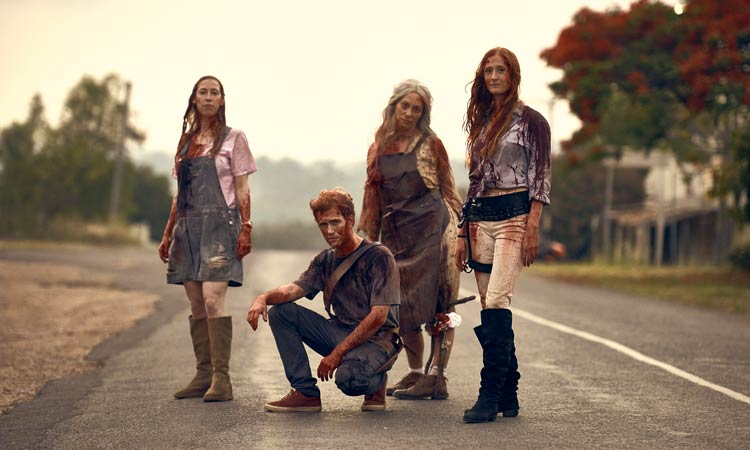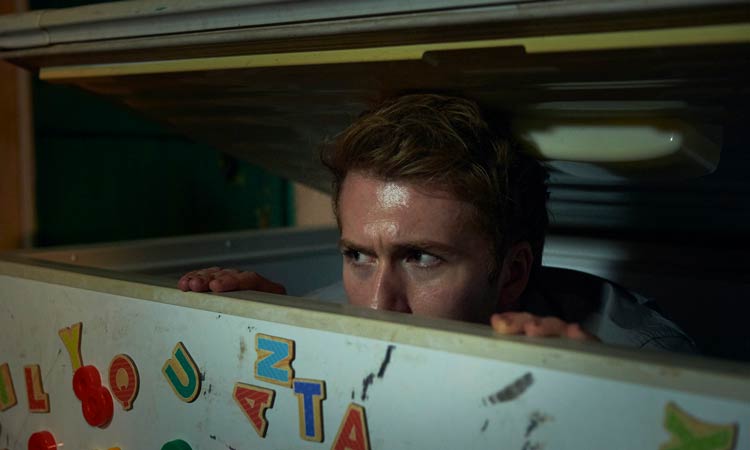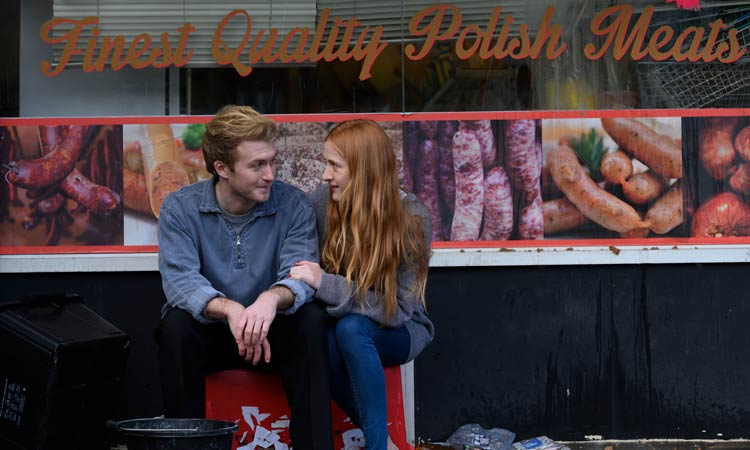Telling the cannibalistic tale of Brits abroad, Two Heads Creek is a very witty slice of shock and horror written and starring Jordan Waller and directed by Jesse O’Brien.
After the death of their adoptive mother, a shy butcher, Norman (Jordan Waller) and his drama queen sister, Anabelle (Kathryn Wilder) leave the UK and adventure to Australia in search of their biological mother, but the local townsfolk of Two Heads Creek are hiding a dark secret. Soon the pair must reconcile their differences to fight for their lives in a playfully dark comedy-horror that takes on immigration and cannibalism.
We spoke to writer and star Jordan Waller about falling into a Twitter trap, Brexit and taking inspiration from The Silence Of The Lambs…

Congratulations on Two Heads Creek running at the FrightFest online festival this year – what’s it been like being at a digital festival?
It’s been weird. I did the terrible thing of reading Twitter when it was all getting streamed and I was actually really gladly surprised. I’m not even really on Twitter but I wanted to know what people thought because you make a film for it to be watched. It was really well received so I was very happy. I’ve gone and watched something I’ve done at a screening before and it’s nerve-wracking! It’s like being on stage but you’re totally out of control because you’ve already done the work – and not only have I written it this time but acted in it as well. So yeah, a double whammy of emotional diarrhea throughout, basically!
Where did you get the idea for Two Heads Creek?
Well, the germ of the idea came when the Brexit referendum result was announced. I woke up and I saw David Dimbleby (who must have been up for about 48 hours because he looked like death himself!) and I just thought ‘Christ this is unexpected’. It’s all been leading up to this point.
[Also] I’d always wanted to write something about cannibalism because I’m obviously disturbed! But I love The Silence Of The Lambs. I watched it when I was quite young – far too young! And I loved it and I just thought ‘God what an amazing film, what an interesting thing cannibalism is’. That incredible taboo.
When I started researching cannibalism in films… there were all these Italian films in the Seventies where explorers would go out to find long lost sisters usually, and it turns out that the sisters had been kidnapped by these cannibal tribes in the Amazon forests. It was all about ‘othering’ different cultures and making them seem kind of strange – basically, there were these big racist undertones towards these cannibal narratives. So something about it all kind of floated together to me, in this slightly kind of crazy, quite obvious way in the film. I don’t try and pretend that it’s subtle, but then bigotry isn’t. You know, bigots who it’s sort of aiming at, they’re not a particularly subtle people either.
Autophagia is about consuming ones that weren’t in one’s own breed but in order to do that you’ve got to ‘other’ them as meat when they’re actually not, you’re forgetting your humanity in the process of doing that, and I think that’s the wider metaphor for the way that immigrants are still mistreated.
Two Heads Creek is a horror comedy – why did you decide to write a film with that mix of genres?
This is much more like the comedy side rather than a horror with comedic elements in it. I’m coming less from the horror side, less from the shock and more of the kind of vulgar laughter. Basically, I think it’s interesting to explore what we’re willing to laugh at and what we’re not willing to laugh at. It’s a difficult thing to do in a climate where language is rightfully getting interrogated an awful lot. But I still think it’s interesting and it’s a worthy pursuit.
What were your inspirations for the film?
The Simon Pegg Cornetto [Trilogy] – I think that it’s obviously been a massive influence. I still think that those films are brilliant and I always wanted to have a go at them. There’s such a massive demand for horror [right now], and rightly so. Actually, horror might be the wave that keeps the cinema alive, you know, and exploring all the different overlaps that horror offers us. I don’t know why, it’s just always been a genre that that speaks to me on some level.
There are some very strong female characters in the movie…
I mean I’m only really interested in writing women. I don’t find men as interesting. I suppose I wrote very strong female characters, and the voice that was in my head [was] Norman – this bashful, slightly self-indulgent man on an onanistic journey of self-discovery was my voice in my head!
Did you have anyone in mind when you were writing those female characters?
Well, I’m usually thinking about two people, either Julia Davis or Goldie Hawn, and I know that neither of them starred in the film [but] I’ve always got strong female archetypes in my mind, and then I tried to kind of nuance them so they’re not two dimensional.
I love writing women. I love older women in particular and that’s where I find a lot of strength. The one thing I don’t like about the horror genre is that for so long it’s just been a kind of sexploitation game of looking at pathetic young women just getting covered in blood and all of that.
We still have women getting covered in blood [in Two Heads Creek] but they are empowered and they’re not screeching. It’s actually the main character, the main male character, who is a bit more pathetic and scared of everything. I kind of wanted to flip it on its head!

We thought Australian actress Kerry Armstrong who plays Mary did a great job being an absolute badass…
She’s absolutely nuts in the most amazing way. She completely made that character her own. She came in and she only shot for about three days but she made a lifetime of traumatic impact upon me! In an incredible way because she just went with it.
She really embodied the character. I just think it’s amazing what she was able to do with her face really. Kathryn [Wilder who plays Annabelle] and I sat there in this scene where she’s basically giving all the exposition of the whole film, which was a tough thing to give somebody to do. You know you’re with a good actor if they can make exposition interesting, and I think she does it really, really well, so I’m very grateful to her.
What was it like being on the set?
Usually, the writer wouldn’t be on set all the time, but then that meant I was always there to sort of collaborate with [director Jesse O’Brien] to a certain extent in terms of [explaining] what things from the script meant, if things weren’t clear – which often they weren’t because I wrote the script when I was like 22 and I hadn’t really got a clue what I was doing!
But it was amazing to see how much the script was changing and how much it changed from the page to the actual making of it and then in the edit everything changing again! I don’t know who it is but someone famous once said that a film isn’t really ever finished and I totally get that. It is always developing and you could carry on, ad infinitum tinkering with it.
Were there any big changes from the original script to what ended up in the film?
One thing was that I originally set the script in Norfolk because I thought it was going to be a lot more Brexit based. But anyway, the money and fortuitous meets between producers and myself and all of that meant that the money eventually came from Australia, which is why it has this kind of Australian vent which works!
Did you have any particular actors in mind for any of the characters when you were writing the script?
Because I’m acting in it and writing it, I didn’t wanna take too much of a producer role [as well]! I didn’t have an awful lot of say, especially with the Australians because I wasn’t as au fait with Australian talent as Judd Tilyard, the Australian producer, and I think we really bagged a lot of strong Australian talent [for the film].
[But] Kathryn, I knew from the theater. I saw her on stage in Kenneth Branagh’s production of Romeo And Juliet. She was just amazing. She was just so funny, her timing was so spot on and I loved her, and she was ginger which is even better! It just made total sense. I read with her and I made it known that I got on very well with her. But to be honest I didn’t have to do much as I think the chemistry between us got translated very well, which it doesn’t always. But I was very lucky with her. She really is great.

Do you prefer writing or acting?
I love the control of writing and I love the freedom of acting. I love being alone with my own imagination but I also love being a big a baby and being able to play around with other people! They’re both very different. I don’t know if I had to pick which one I’d go for, hopefully I never have to pick. I’m really enjoying writing at the moment and I’m really grateful for writing because I think it’s very difficult, not a lot of things are getting filmed at the moment because of Covid so it’s been a real blessing that I’m able to write stuff, even if it never sees the light of day because it’s quite therapeutic in a way.
What’s coming up next for you?
[Off The Rails, which I wrote] has been filmed, that’s got Judy Dench in it. It’s about three middle-aged women who re-create an inter-railing trip from their youth after their best friend dies. It is totally different to this film in every conceivable way. It’s light rom-com, silver-screen-esque sort of stuff. But Judy Dench is in it so it’s a dream!
FrightFest Presents and Signature Entertainment present Two Heads Creek on Digital HD out now.
